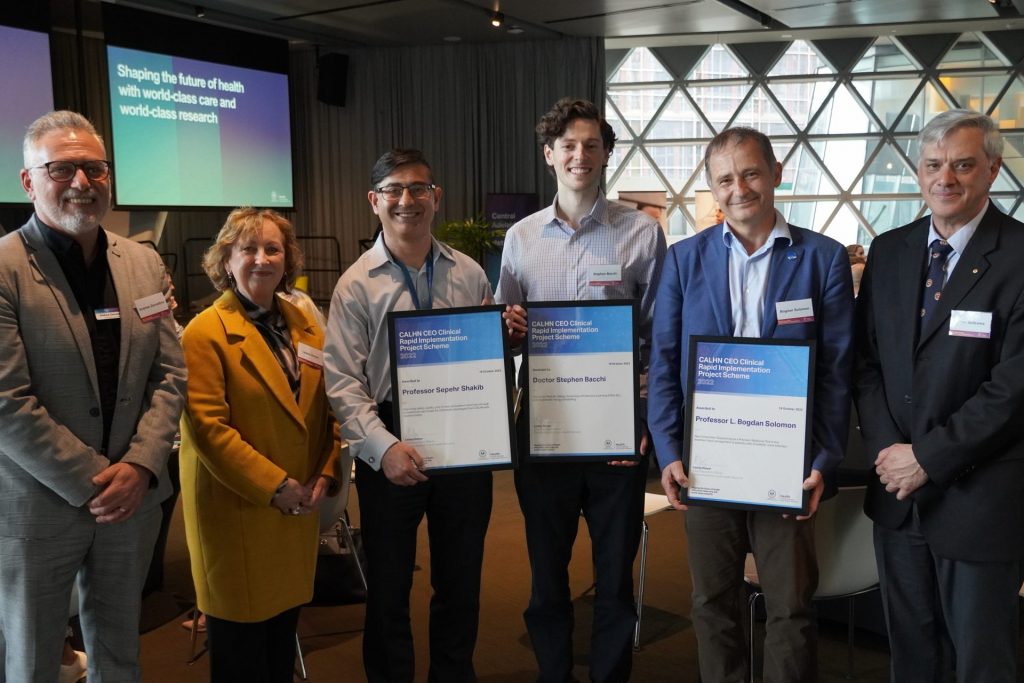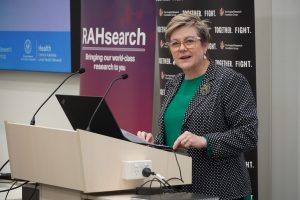World-class care driven by world-class research is the aim behind a suite of grants awarded to kickstart three innovative projects in 2023.
The CEO Clinical Rapid Implementation Project Scheme – better known as CRIPS – offers grants of up to $200,000 over two years to support innovative projects that identify real solutions and improve health service delivery within CALHN.
“Research underpins everything we do here at CALHN, and we are committed to continuing to push the boundaries and explore new possibilities in health services,” said CALHN CEO Lesley Dwyer.
The grant winners are:
Electronic penicillin allergy screening with machine learning (EPAS-ML) with systematic allergy de-labelling
Dr Stephen Bacchi, Research Access Appointment and Neurology Registrar
Penicillins are first-line antibiotics for many life-threatening and common infections. Approximately 10% of hospital patients are ‘labelled’ as allergic to penicillins and receive alternative antibiotics which may be less effective.
However, more than 90% of people who have a penicillin allergy label are not actually allergic to penicillin and can be “de-labelled”.
Dr Stephen Bacchi and colleagues will use specific machine learning algorithms to identify RAH inpatients suitable for penicillin allergy evaluation and use a proactive de-labelling pathway to remove allergy labels.
This could reduce hospital length-of-stay, hospital readmissions, postoperative complications, rates of Clostridium difficile infections, and help slow the growing rates of antibiotic resistance.
Next generation sequencing as a precision medicine tool in the treatment and management of patients with prosthetic joint infection
Professor L. Bogdan Solomon, Head of Unit, Orthopaedics, Royal Adelaide Hospital
Prosthetic joint infection (PJI) is a catastrophic complication of orthopaedic joint replacement surgery with a mortality rate similar to cancers.
For many patients, the infecting organism(s) cannot be detected in time to deliver effective treatments.
Professor Solomon and his colleagues will use next generation sequencing to identify the organisms responsible for PJI to facilitate accurate and improved diagnosis as well as reduce length of hospital stays, re-operation/readmission rates, treatment costs and post-surgery complications.
Improving safety, quality, cost of care, and patient outcomes through a transitional care service for individuals with multimorbidity
Professor Sepehr Shakib, Consultant, Clinical Pharmacology
Disjointed care following hospital discharge of older patients living with multiple chronic conditions (multimorbidity) results in high rates of hospital readmission and poorer health outcomes.
Professor Shakib and colleagues will implement a nurse-led, transitional care intervention for people with multimorbidity. For each discharge, a nurse will:
- conduct a baseline assessment of participants’ needs upon discharge
- collaboratively develop a transition plan to address the patient’s needs
- monitor participants’ symptoms via routine telephone follow-up
- coordinate care between the primary and secondary healthcare sectors for approximately 10 weeks from discharge
This has the potential to improve patient experience, satisfaction and quality of life as well as reduce symptom burden and hospital readmission rates.
Pictured, left to right: Professor Andrew Zannettino (Executive Director, Research Strategy), Lesley Dwyer (CALHN CEO), Professor Sepehr Shakib, Dr Stephen Bacch, Professor L. Bogdan Solomon, and Professor John Beltrame.



